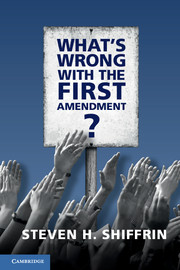7 - Democracy
from PART I
Published online by Cambridge University Press: 05 September 2016
Summary
It is deeply problematic that speech is privileged over privacy, fair trials, racial and sexual equality, and the public health, to take a number of the examples we have discussed. But it may be even more bothersome that the First Amendment is interpreted in ways that are at odds with any sensible understanding of democracy.
I do not mean to suggest that the First Amendment is the only problem by any means, but its interpretation has deepened our democratic difficulties. Even before the Court decisions I criticize in this chapter, it has been the case that our “democracy” has given undue weight to the input of wealthy individuals and of business corporations. This kind of weight does not fit with any of the wide array of democratic theories. Edmund Burke, Walter Lippman, and Joseph Schumpeter, among others, have argued for a form of elitist democracy. They recognized that elections are necessary to determine who shall rule, but in various ways, they suggested that citizens do not know enough to otherwise rule. So elites need to rule in ways that further the public interest. Nothing in their various theories, however, suggested that the elites were confined to the wealthy, let alone to the notion that corporations were wise members of the elite.
James Madison seemed to favor a form of pluralist democracy in which the people were to take a stronger rule than suggested by the conception of elitist democracy, and Robert Dahl maintained that pluralism better described American democracy than the elitist approach. On this understanding, people's interests were represented in groups or factions. And those groups applied pressure in the political sphere to advance their interests. In turn, leaders made decisions designed to bring about the best resolution of those conflicting interests. To the extent, groups were unrepresented or victims of prejudice, John Hart Ely argued that courts did and should protect their interests.
Various other theorists advanced forms of Civic Republicanism or Deliberative Democracy that challenged aspects of Dahl's pluralist picture. First, the pluralist picture seems to assume that citizens exclusively advanced their own interests as opposed to the public interest. Some theorists maintained that the pluralist theory exaggerated the degree of conflicting interests. They argued that there was frequently a common good that could be arrived at through public dialogue.
- Type
- Chapter
- Information
- What's Wrong with the First Amendment , pp. 95 - 112Publisher: Cambridge University PressPrint publication year: 2016

